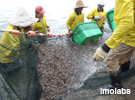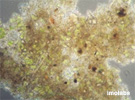Aquaculture

Aquaculture feed represents the most significant production cost item for an aqua-farm. Furthermore, the quantity and quality of aquaculture feeds are primary factors influencing growth of the cultured species impacting its Average Body Weight (ABW) and Feed Conversion Ratio (FCR), the nitrogen loading of the water environment, and disease proliferation which in turn affects the survivability rate.
IMO Labs has spent over 10 years researching, developing and testing solutions for aquaculture. IMO Labs has developed three products in the Mikros range to help farmers face their challenges. In addition to this, IMO Labs has also integrated these 3 products into industry best practices to come up with a biological system for sustainable and enhanced aquaculture. This system can be customised and adapted to existing farms. The underlying principle of IMO Labs' aquaculture solutions and system is the use of microorganisms to generate and control marine aggregates called "bio-flocs" in the ponds and reservoirs. The bio-flocs represent a very effective way to manage waste water in many different situations and IMO Labs offer research services to apply the bio-flocs to solve specific problems as and when required by customers.
- Customised Solutions - BioSEA
- Products - Mikros
- Contract R&D - BioFlocs
- Resources
Biological Sustainable Enhanced Aquaculture System (BioSEA)
|
The Biological Sustainable Enhanced Aquaculture (BIOSEA) system is a biological aqua-farming system which has the following characteristics:
BIOSEA is particularly suitable for rehabilitating abandoned or sick farms. BIOSEA has been tested exhaustively since 1998 and is currently implemented in commercial inland aqua-farms for fish and prawn farming in the Philippines and Malaysia. |
Mikros for Aquaculture
The Mikros range of solutions BioPOND, NUTRI and AquaCLEAN have been tested extensively in successive grow-outs in commercial aquaculture farms in Asia ranging from 5 hectares to 50 hectares. They have also been tested under different water conditions – varying pH and salinity – and when used in tandem, they consistently show superior water quality, higher productivity gains in ABW and FCR vs. the standards claimed by commercial feed manufacturers for L. vannamei, P. monodon, M. rosenbergii, tilapia, catfish and milkfish cultures.
Mikros NUTRI |
||
Mikros BioPOND |
||
|
Mikros AquaCLEAN |
Bio-Flocs
|
Bio-flocs are suspended aggregates that consist of a mixture of microorganisms, algae, floating solids, and undissolved organic compounds. In aquaculture, bio-flocs occur naturally and serve as an important source of nutritious feed for aquatic organisms, help improve water quality, reduce the cost of feeds and the amount of land required. Microbial induction of flocculation occurs naturally within an aquaculture system, but it is unpredictable. A traditional method to induce natural flocculation is by adding starch to the pond, which is also very expensive. IMO labs conducts research work to induce flocculation, using methods which not only have minimal intrusion upon the daily routine of a farmer and also incur minimal costs. |
Resources
Tapping the Microbiome for Commercial and Sustainable Applications
Presented at BioMalaysia 2012, 6-7 November 2012 at Kuala Lumpur, Malaysia.
The Role of Natural Biotechnoloy from Aqua-Breeding to Market
Presented at BioMalaysia 2010, November 2010 at Kuala Lumpur, Malaysia.
Induction and Regulation of Algal-flocculation, Using
Marine Microbial Isolates and High Protein Extract
Presented at International Society of Microbial Ecology Conference 13, 22 Aug – 27 Aug 2010, Seattle, USA.
Algal diversity dynamics in a prawn-fish-shrimp close loop system mediated by mixed culture probiotics
Presented at the Asia Pacific Aquaculture 2009. Nov 3-6, 2009. Kuala Lumpur, MALAYSIA.
Flocculation studies of selected microalgae using microbial cultures
Presented at the Asia Pacific Aquaculture 2009. Nov 3-6, 2009. Kuala Lumpur, MALAYSIA.
Probiotic enhanced recirculating system for prawn cultivation: towards a residue-free shrimp
Paper presented at the 5th Asian Conference on Lactic Acid Bacteria: Microbes in Disease Prevention and Treatment – Jul 1 – 3, 2009, SINGAPORE.
The use of molecular, microscopic and densitometric methods in studying exopolymeric substances-induced algal-bacterial-fungal bioflocculation
Presented at the Second National Symposium of the Philippine Phycological Society, Inc. - Apr 13, 2009, SEARCA, UPLB, PHILIPPINES.
Introduction to the BIOSEA system (Biological Sustainable Enhanced Aquaculture)
Effect of microbial consortium application on bacterial flocculation dynamics of marine-based aquaculture system
Presented at the 12th International Symposium on Microbial Ecology (ISME-12), August 2008, Cairns, Australia
Focus on Sustainable Aquaculture: Bio floc technology
Article with reference to Bionovar's technology for bio flocs, Aqua Culture Asia Pacific, July/August 2008
Management Of Microbial Flocculation In Shrimp Ponds By Controlled Inoculation Of
Bacterial Mixed Cultures
Invited Presentation at the World Aquaculture Society Meeting, May 2008, Busan, Korea
Economic Optimization of White Prawn Litopenaeus vannamei Production by Stocking Density Management with the use of Probiotic System (BioSEA)
Presented at the Asia Pacific Aquaculture Society Meeting Aug 2007, Hanoi, Vietnam
Effect of Bionovar Probiotics Aqua Technology on Freshwater Prawn Macrobrachium rosenbergii Cultivation in Peninsular Malaysia
Presented at the Asia Pacific Aquaculture Meeting, Aug 2007, Hanoi, Vietnam
Economic Viability of Rehabilitation of Disease-Prone Prawn-Shrimp Farm with the use of BIOSEA
Poster presented at the World Aquaculture Society Meeting, Feb 2007, San Antonio, USA
Effect of formulated microbial consortium in the treatment of toxic ammonia and nitrate on
tiger prawn culture, Penaeus monodon
Poster presented at the World Aquaculture Society Meeting, Feb 2007, San Antonio, USA
High Density Culture of White Shrimp, Litopenaeus vannamei, using Probiotic Treatment
Poster presented at the World Aquaculture Society Meeting, Feb 2007, San Antonio, USA







